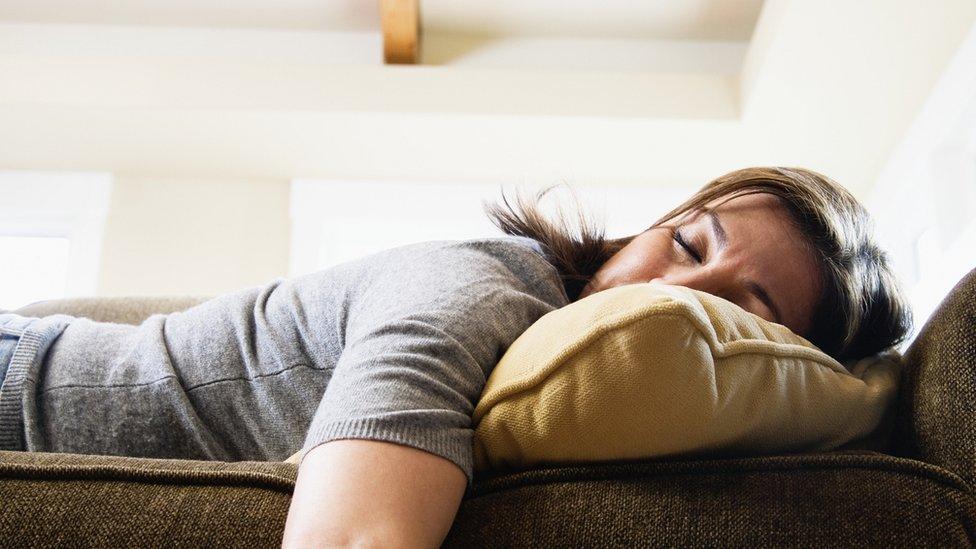The week ahead in Parliament
- Published
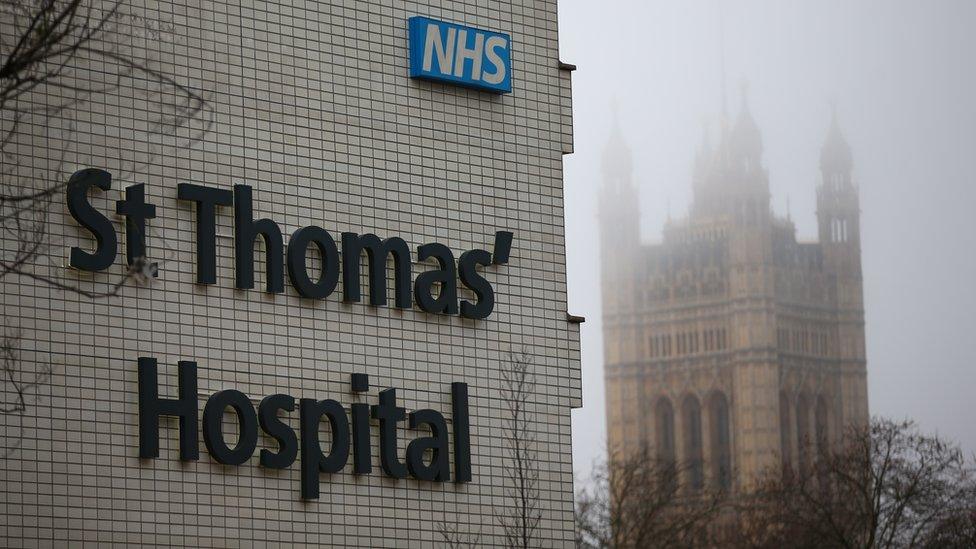
It's a pervasively pandemic-focused week, as the Commons returns from its extended (although interrupted) Christmas break.
Whether it's in the main chamber, Westminster Hall or on the committee corridor, the ramifications of Covid-19 are seldom far away.
The prime minister is due to be questioned by the Liaison Committee on Wednesday, whilst there's a full-dress general debate on Tuesday, two petitions committee debates on Monday, specific debates on so-called 'long Covid' and pandemic dentistry on Thursday, plus a hatful of virus-related committee hearings.
Here's my rundown of the week ahead. It comes with the usual health warning: this blog is based on the published parliamentary agenda on the date of writing.
Ministerial statements and urgent questions can be dropped into the proceedings at short notice, committees can set up emergency hearings, and it is always open to the government to re-arrange business if there's an urgent need to debate or legislate, so what you see here may not be what you get. "Events, dear boy..."
Monday 11 January
The Commons opens (14:30 GMT) with Housing, Communities and Local Government Questions. It is highly probable that this will be followed by one or more ministerial statements or urgent questions.
Then the main debate is a general one on the subject of "Global Britain" and options for a post-Brexit future.
In the closing adjournment debate, Conservative Danny Kruger and Labour's John Cruddas will talk about using technology to build a more connected society.
In Westminster Hall (16:30), MPs will debate an online petition that urges the government to appoint a dedicated minister for the hospitality industry, followed by a second which calls for teachers, school and childcare staff to be prioritised for Covid vaccination.
Vaccines also feature on the committee corridor, where Public Accounts (14:30) hears from Kate Bingham, chair of the UK Vaccine Taskforce, and other senior figures.
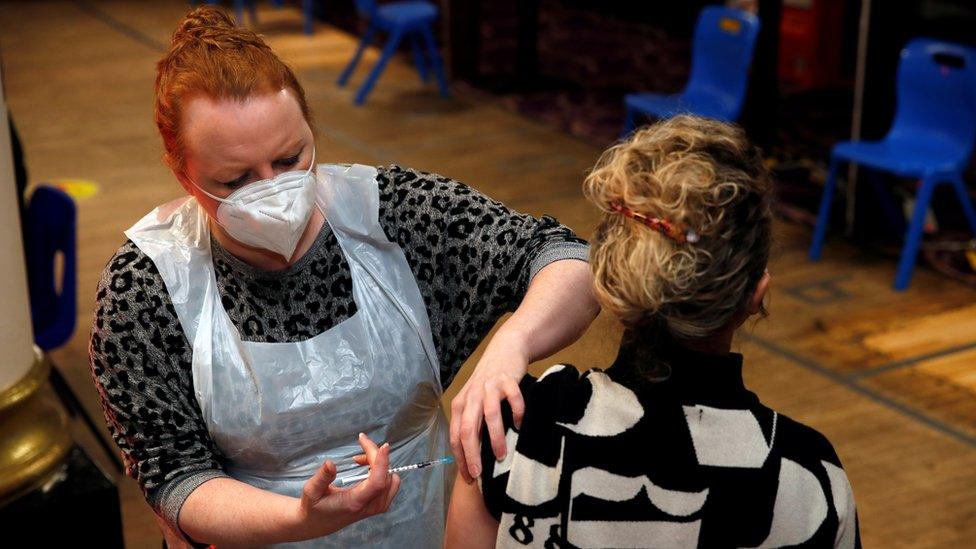
The UK is aiming to offer a first vaccine dose to around 15 million people by mid-February.
Treasury (15.30) looks at the UK's new economic and trading relationship with the EU, with witnesses from Logistics UK, and the financial services industry. And Housing, Communities and Local Government (16.30) continues its inquiry into supporting high streets after Covid-19.
In the Lords (13:00), questions to ministers include one from former culture secretary Baroness (Nicky) Morgan, who will asks about the resumption of grassroots sporting fixtures, and re-opening of sport facilities.
There's also an interesting question about the extension of the Defamation Act 2013 to Northern Ireland - that act, which brought in new statutory defences of truth, honest opinion, and "publication on a matter of public interest" does not apply in Northern Ireland, and the asker of the question, Conservative peer Lord Lexden, argues freedom of speech is more limited as a result.
Watch out for interventions from the Lords' contingent of heavyweight lawyers. Lord Garnier, former solicitor general, will be among those asking supplementary questions, along with Lord Black of Brentwood, deputy chairman of the Telegraph Group.
There will be a private notice question at (14:00) from Lib Dem Lady Grender, asking if the government plans to reinstate the "Everyone In" scheme that is thought to have saved the lives of hundreds of rough sleepers during the first lockdown.
Then peers begin the first day of detailed report stage scrutiny on the Covert Human Intelligence Sources (Criminal Conduct) Bill, which gives ministers powers to authorise covert human intelligence sources (CHIS) to commit what would otherwise be criminal offences.
The argument is that this is essential to gain the trust of, for example, groups that would cause the UK harm, as part of a wider investigation. But this has created concerns that crimes, like murder and sexual offences, could be carried out by a CHIS. As a result peers have presented a battery of amendments to limit the powers in the bill.
Labour's Lady Chakrabarti leads on a cross-party amendment which would preserve the current legal position that those authorised to engage in criminal conduct are not immune from either civil or criminal liability.
The Lib Dem Lord Paddick and the former reviewer of terrorism legislation Lord Anderson have an amendment to require that those authorising a CHIS have a (legally testable) reasonable belief in the necessity and proportionality of a criminal conduct authorisation.
Labour's Lord Hain (himself the subject of covert investigation, beginning with his activities as an anti-apartheid activist in the '70s) and former Home Secretary Lord Blunkett want the powers to be dependent on the home secretary signing a warrant, and the Lib Dems Lord Paddick and Lady Hamwee want the authorisations to last for four months before having to be renewed or ended.
Former Conservative cabinet minister Lord Young of Cookham heads another cross-party amendment with Lady Chakrabarti and Lord Paddick to prevent criminal conduct authorisations being given to children.
There's also a slightly less stringent amendment on the same issue from another cross-party group led by Labour's Lady Massey of Darwen, which would allow children to be given a CHIS authorisation only with the permission of a judge. There are also amendments which aim to provide protection to other vulnerable groups.
Finally, Labour's Lady Clark of Kilwinning wants to require approval by a judge for CHIS authorisations intended to identify or confirm journalistic sources, and there would have to be an "over-riding public interest" for approval to be given.
Tuesday 12 January
Commons business opens (11:30) with Health and Social Care Questions.
Then, assuming no statements or urgent questions intervene, Conservative MP Kevin Hollinrake has a ten-minute rule bill calling for the abolition of business rates.
That is followed by one of the regular general debates on Covid-19 promised by the government to allow MPs to air their concerns.
In Westminster Hall (09:30) there are debates on the persecution of Muslims, Christians and minority groups in India, on the effect of the Covid-19 pandemic on early years settings (14:30) and on squash and the Olympics (16:00).
On the committee corridor, the Health and Social Care Committee (09:30) takes evidence on workforce burnout and resilience in the NHS and social care. This session will focus on the importance of leadership and workplace culture, and a second panel will explore the specific issues faced by staff from ethnic minorities.
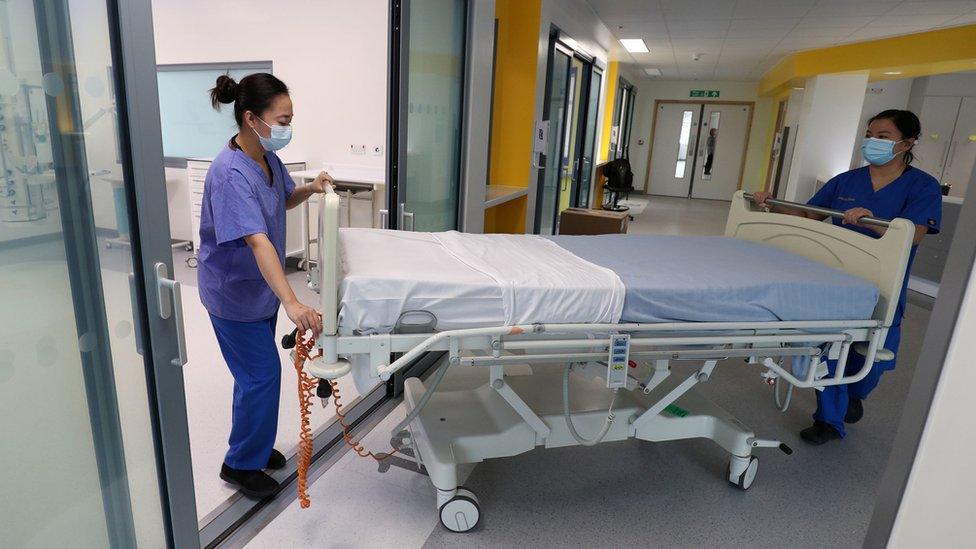
The committee hearing comes at a time of huge pressure on NHS staff coping with the Covid pandemic.
Elsewhere at 10.00 GMT, the Committee on Arms Export Controls - which conducts a regular review into the UK's arms trade - quizzes Paul Everitt, the chief executive of ADS, the trade organisation representing the aerospace, defence, security and space industries.
Foreign Affairs (14:30) continues its hearings on the Xinjiang detention camps in China with witnesses from Genocide Watch and other groups. Defence (14:30) has a follow-up hearing on the mental health of military veterans, with evidence from a specialist trauma psychotherapist, Combat Stress, Help for Heroes and the Royal British Legion.
In the Lords (12:00) ministers field questions on enforcement rates for animal welfare and wildlife crime offences, the cost of replacing gas boilers and heaters in all UK homes, and the reliance of the economy and society on technology to deliver essential services.
Then peers move on to the first day of detailed report stage consideration of the Medicines and Medical Devices Bill.
The main issues here will be amendments to constrain the extensive "Henry VIII" delegated powers the bill will give to ministers. Other issues include data sharing and protecting NHS patient confidentiality, the Patient Safety Commissioner and Redress for victims, and regulatory divergence in Northern Ireland because of the post-EU NI Protocol.
There's an intriguing-looking session of the Lords' special Covid-19 Committee (10:00), looking at the long-term impact on wellbeing of living online. The witness list is led by Robin Dunbar, professor of evolutionary psychology at the University of Oxford
Wednesday 13 January
The Commons opens at 11:30 with half an hour of Women and Equalities Questions, followed at noon by Prime Minister's Questions.
The day's ten-minute rule bill sees Labour's Tracy Brabin call for the government to identify gaps in its financial support package for the Covid pandemic.
The main legislative action is the report and third reading of the Financial Services Bill.
This is a highly technical measure dealing with such matters as the prudential rules which require financial firms to hold a minimum level of assets so that they and the markets can weather tough economic times.
The bill also increases the maximum sentences for insider dealing and market manipulation from seven to ten years' imprisonment, bringing them into line with the penalties for fraud.
In Westminster Hall, there are debates on support for pupils' education during school closures (09:30), discharges into rivers (11:00), online anonymity (14:30), desecration of war memorials (16:00) and the political situation in Kashmir (16:30).
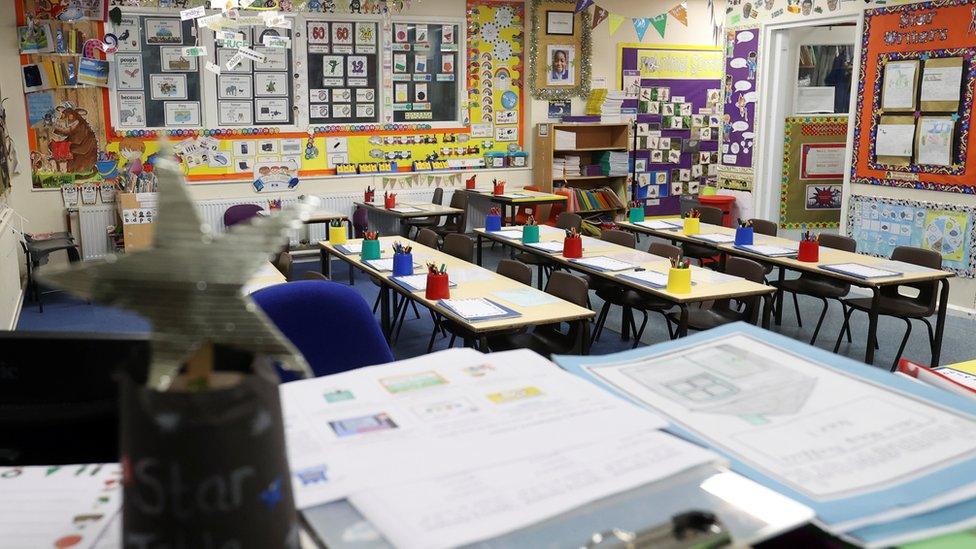
Classrooms around the UK are currently closed to most pupils during the latest lockdowns.
On the committee corridor, the big event is Boris Johnson giving evidence to the Liaison Committee - the super-committee of select committee chairs (15:30).
Education Secretary Gavin Williamson will also face questions at the Education Committee (09:30) about his decision to close schools in England and what is being done to support children's learning.
The Brexit Committee takes evidence from industry representatives (09:30) and Northern Ireland Affairs (09:30) will question criminal justice experts on the implications of the EU-UK trade deal for cross-border security co-operation, covering extradition arrangements, data sharing between law enforcement agencies and law enforcement and judicial co-operation.
And Human Rights (15:00) looks at the human rights implications of long lockdowns with evidence from, among others, a mother and a husband of a care home resident.
In the Lords (12:00), question time ranges across the arrest and transfer of suspects between the EU and the UK, the number of people from black, Asian and ethnic minority communities participating in Covid-19 vaccine trials, and the impact of household mixing from 23-27 December on virus infection rate.
Then peers resume detailed scrutiny of the Covert Human Intelligence Sources (Criminal Conduct) Bill, with day two of report stage.
Thursday 14 January
MPs begin their day (09:30) with International Trade Questions, followed by Commons Business Questions. In the afternoon they debate two subjects selected by the Backbench Business Committee.
The first, led by Lib Dem Layla Moran, Conservative Dan Poulter and Labour's Andrew Gwynne, will focus on what public services will have to do to support people suffering with long-term effects from Covid-19.
The second debate will be on the effect of Covid on dental services - led by Labour MPs Fleur Anderson and Barry Gardiner.
In Westminster Hall, there are debates on the Towns Fund (13:30) and the future of the UK's space industry (15:00).
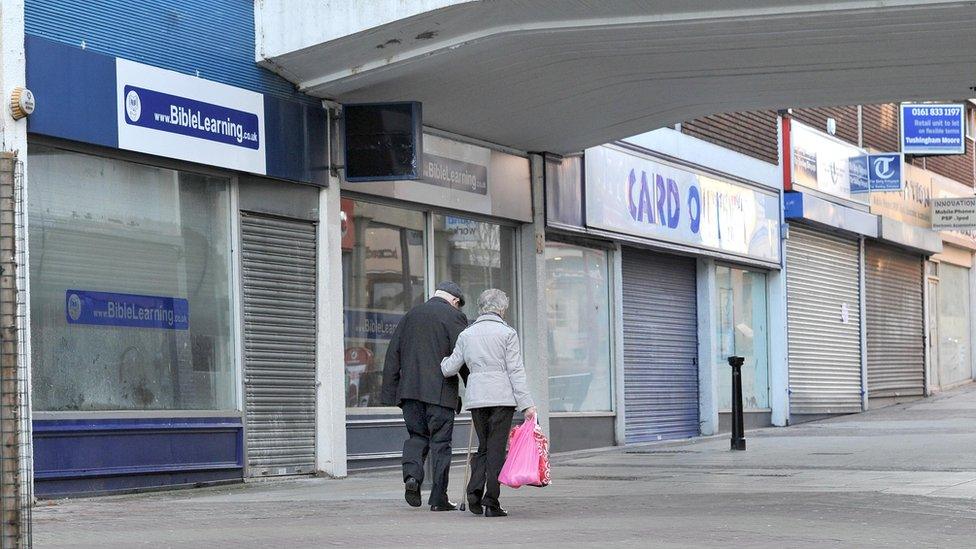
MPs have previously criticised how cash from the Towns Fund, intended to help struggling towns, has been allocated.
The committee action includes Public Accounts looking at Managing flood risks (10:00) with the Environment Agency and the top civil servant at the Department for Environment, Food and Rural Affairs.
It will follow up on a National Audit Office report which, among other things, found that the damage from the 2019-20 winter floods has more than doubled, external the number of homes at risk from flooding.
Digital, Culture, Media and Sport (14:30) has a pre-appointment hearing for the new chair of the BBC, the former Goldman Sachs banker Richard Sharp.
In the Lords (12:00) there are questions on establishing the Constitution, Democracy and Human Rights Commission, dialogue between the UK and the EU about foreign policy, and retention payments in the construction industry
Peers then continue their report stage scrutiny of the Medicines and Medical Devices Bill.
Friday 15 January
The Commons sits (09:30) to debate private members' bills - ideas for new laws proposed by backbench MPs.
First up is the second reading of the National Minimum Wage Bill, proposed by Labour's Paula Barker.
Her bill aims to tighten up the law on the payment of the national minimum wage, and end what she says is "the scandal of domiciliary - or homecare - workers not being paid properly for so-called travel time, or the time it takes to travel between individual home care visits."
That is followed by the Trade Agreements (Exclusion of National Health Services) Bill from the SNP's Peter Grant, the Prime Minister (Temporary Replacement) Bill from the Conservative Peter Bone, and the National Health Service Expenditure Bill from Lib Dem MP Jamie Stone.
There are plenty more bills listed, but the chances are most will not be debated in the available time.
Related topics
- Published15 October 2020
- Published16 December 2020
